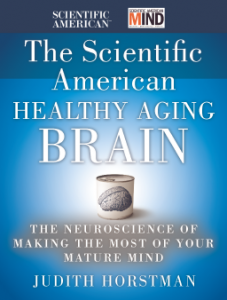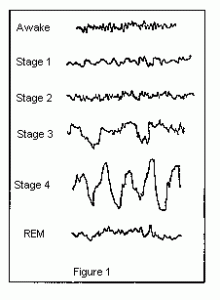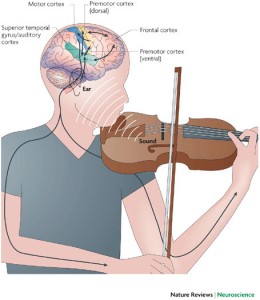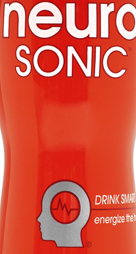Using Neuroscience to Optimize the Mature Mind
 Just finished a good book by Judith Horstman where she explains the neuroscience of making the most of the mature mind. Her findings echo the discussions we have had on the Next Brain Blog. For example, Part three of the book explains in detail how exercise, nutrition, mental stimulation, being social and attitude play a central role in improving cognitive performance as we age.
Just finished a good book by Judith Horstman where she explains the neuroscience of making the most of the mature mind. Her findings echo the discussions we have had on the Next Brain Blog. For example, Part three of the book explains in detail how exercise, nutrition, mental stimulation, being social and attitude play a central role in improving cognitive performance as we age.
She pegs 20-60 years old as the zone of maximum performance for the brain but quickly points out some people peak later in their 70s, 80s and even 90s! She put the central idea of this blog, namely we are responsible for building our next brain, in plain language:
“You built the brain you have today and will continue to refine and remodel it with every action, thought, and feeling and every interaction with people, the experiences, and the environment around you.”
Have you read the book? If so what techniques or insights do think are the most important for building Your Next Brain?
Categories: Books, Cognitive Development, Older Adult Tags:
Good Grades are Mostly Determined by Self-Control
 I am often asked by parents what type of skills are critical for success in school. They hear about special programs or techniques for reading, note taking or math skills and want to know if they work. That is why I am always on the lookout for scientific research that probes how the mind’s of high-performing students work.
I am often asked by parents what type of skills are critical for success in school. They hear about special programs or techniques for reading, note taking or math skills and want to know if they work. That is why I am always on the lookout for scientific research that probes how the mind’s of high-performing students work.
For example, recent research on nearly 700 German eighth graders suggests that a student’s level of self-control is the number one factor that determines success. It is more important than memory, general intelligence, verbal ability, mental speed, numerical ability and even creativity. The researchers claim:
“The data show that the most important factor in getting good school grades was the student’s score on psychological tests of self-control. Cognitive ability was the next best predictor of grades, but in fact, it was not a very strong one.”
While not a surprise to readers of the Next Brain Blog, this is an important finding. Delaying gratification, managing procrastination and the ability to structure and manage time are the capacities that students need for success.
I am interested to hear from readers with insights into how to be an effective student. What learning and testing taking skills are critical and how can we develop them?
Categories: Child, Cognitive Development, College Student, IQ and EQ, Memory and Learning, Training Tags:
Evidence of Learning New Things While Sleeping
 Many of the emails and comments I get have to do with sleep learning. Readers ask if it possible to learn something new while they sleep. So I am always on the lookout for scientific studies that claim we can be taught new concepts or skills while we sleep. Unfortunately, I have not been able to find studies that demonstrate that scientifically, until now.
Many of the emails and comments I get have to do with sleep learning. Readers ask if it possible to learn something new while they sleep. So I am always on the lookout for scientific studies that claim we can be taught new concepts or skills while we sleep. Unfortunately, I have not been able to find studies that demonstrate that scientifically, until now.
Research done at the Weizmann Institute and reported in Nature Neuroscience demonstrates that we are able to learn an association between smells and tones while we sleep. Specially researchers:
“… found that if certain odors are presented after tones during sleep, people will start sniffing when they hear the tones alone – even when no odor is present – both during sleep and, later, when awake. In other words, people can learn new information while they sleep, and this can unconsciously modify their waking behavior.”
So you can learn to sniff in response to a tone while asleep. This does not prove that we can learn more complex and important things while asleep but it does show some new learning is possible. It provides encouragement for personal experimentation with sleep learning. I am interested to hear from readers of the Next Brain Blog that use some form of sleep learning technique. How has it improved your brain function or cognitive performance?
Source of Image: Brain Basics – Understanding Sleep
Categories: Memory and Learning, Music and Audio, Sleep Tags:
Some Foods Boost Moods Like Prescription Drugs
![]() Being in a positive mood can speed learning, deepen creativity and otherwise improve our cognitive performance. So I am always on the lookout for scientific research on how to create and sustain positive moods. For example, at a recent meeting of the American Chemical Society, researchers reported:
Being in a positive mood can speed learning, deepen creativity and otherwise improve our cognitive performance. So I am always on the lookout for scientific research on how to create and sustain positive moods. For example, at a recent meeting of the American Chemical Society, researchers reported:
“The large body of evidence that chemicals in chocolate, blueberries, raspberries, strawberries, teas and certain foods could well be mood-enhancers encourages the search for other mood modulators in food,” noted Martinez-Mayorga”
We have reported on some of these foods before in the Next Brain Blog because there is evidence they boost brain function and cognitive performance directly. Some are new – teas, raspberries and strawberries. Interestingly, the active ingredient that seems to be doing the work is similar to the active ingredient (valproic acid) in prescription mood stabilizers such as Depakene, Depakote and Stavzor.
What techniques do you use to enhance and prolong productive moods?
Categories: Diet, Manage Emotions Tags:
Develop Advanced Skills Even Late in Life
 The Kavli Foundation recently released a readable neuroscience research summary titled The Fantastic Plastic Brian. The report highlights the claim that adult brains remain adjustable even in the last years of life. Being adjustable (or plastic) means new neural connections can form and deep learning can take place. One example from the study:
The Kavli Foundation recently released a readable neuroscience research summary titled The Fantastic Plastic Brian. The report highlights the claim that adult brains remain adjustable even in the last years of life. Being adjustable (or plastic) means new neural connections can form and deep learning can take place. One example from the study:
I know a woman who didn’t begin to paint until she was in her 60’s, yet ended her life as a professional painter of high quality. We are capable of remarkable brain changes contributing to the development of remarkable new abilities at any stage of life.
This is an important finding. It means that not only are there natural cognitive advantages to aging (e.g. increased wisdom, emotional intelligence and learning from experience ability) it is possible to develop professional grade skills even in the most challenging domains.
I am interested to hear from readers that have develop new skills after 55 in art, science, engineering, technology, business, writing or another professional area.
Categories: Cognitive Development, Training Tags:
Bilingual Kids Can Have Mental Advantages
 I get emails from parents interested in hearing about evidence-based ways to improve their children’s brain function and cognitive performance. So I am always on the lookout for scientific studies that suggest Next Brain development ideas for kids. That’s why a university study from Scotland caught my eye. Researchers there found that children speaking two languages (bilingual) can have more mental agility than those that don’t. More specifically:
I get emails from parents interested in hearing about evidence-based ways to improve their children’s brain function and cognitive performance. So I am always on the lookout for scientific studies that suggest Next Brain development ideas for kids. That’s why a university study from Scotland caught my eye. Researchers there found that children speaking two languages (bilingual) can have more mental agility than those that don’t. More specifically:
“Our study has found that it can have demonstrable benefits, not only in language but in arithmetic, problem solving and enabling children to think creatively. We also assessed the children’s vocabulary, not so much for their knowledge of words as their understanding of them. Again, there was a marked difference in the level of detail and richness in description from the bilingual pupils.”
The children in the study were around age nine and the bilinguals spoke Italian and English. It is important to note that they do not claim that learning a second language will produce these cognitive improvements. But is is suggestive.
Interested to hear from readers that live in a bilingual household or that have extensive second language experience. How does it enrich your language skills and thinking abilities?
Categories: Child, Cognitive Development, Problem Solving, Training Tags:
10 Years of Music Creates Big Cognitive Reserve
 We have covered the importance of music for improving cognitive performance in several posts on the Next Brain Blog. Some researchers argue that learning to play a musical instrument is one of the best ways to improve and maintain brain function.
We have covered the importance of music for improving cognitive performance in several posts on the Next Brain Blog. Some researchers argue that learning to play a musical instrument is one of the best ways to improve and maintain brain function.
A new study, from Emory University supports this idea but provides some specifics:
“… musicians with at least 10 years of instrumental musical training remained cognitively sharp in advanced age.”
Even if subjects stopped playing at some point in life the positive effects linger as long as they played for at least 10 years. Through a decade of musical practice you build up a type of cognitive reserve that can be used later. As the article reports:
“This is an exciting finding in light of recent evidence suggesting that high educational levels are likely to yield cognitive reserve that may potentially delay the onset of Alzheimer’s symptoms or cognitive decline,…”
Ten years may seem like a large investment but developing a strong and resilient brain is a life-long process. Interested to hear from readers that have experience learning and playing a musical instrument. Are you building a cognitive reserve?
Source of Image: When Brain Plays Music
Categories: Music and Audio, Older Adult, Training Tags:
Tai Chi Boosts Brain Volume and Performance
 Research led by the University of South Florida found elderly Chinese that practiced Tai Chi three times a week scored significantly higher on thinking and memory tests than a control group. They also demonstrate that the volume or physical size of the subject’s brain increased rather than experiencing age-related shrinkage.
Research led by the University of South Florida found elderly Chinese that practiced Tai Chi three times a week scored significantly higher on thinking and memory tests than a control group. They also demonstrate that the volume or physical size of the subject’s brain increased rather than experiencing age-related shrinkage.
This is an interesting finding because it suggests a non-areobic form of exercise can improve brain function.
Tai Chi is a type of martial arts. It includes five training elements the most widely known being the slow solo hand movements. The training emphasizes focusing your mind exclusively on the motion being practiced. This produces a meditative-like calm which might account for the brain boosting effects.
For more details on the brain health benefits and a video introduction check out the Next Brain Blog post on Tai Chi for Cognitive Training.
Source of Image: China on the brink
Categories: Ancient Ways, Lifestyle, Memory and Learning, Older Adult Tags:
Strengthen Existing Memories While You Sleep
Learning during sleep is a long sought goal. Exciting new research from Northwestern University reveals that you can but there is a hitch. You can only strengthen existing memories not learn something new.
 They demonstrated the effect for learning to play a new tune. Subjects practiced learning two new tunes on a key board and then took a 90-minute nap. During the nap they were exposed to one tune but not the other. Upon awakening they committed fewer errors playing the tune they heard while sleeping.
They demonstrated the effect for learning to play a new tune. Subjects practiced learning two new tunes on a key board and then took a 90-minute nap. During the nap they were exposed to one tune but not the other. Upon awakening they committed fewer errors playing the tune they heard while sleeping.
The researcher speculate how this might be applied more broadly:
“If you were learning how to speak in a foreign language during the day, for example, and then tried to reactivate those memories during sleep, perhaps you might enhance your learning.”
I am interested to hear from readers that have experimented with learning during sleep. Did you learning any new?
Categories: Memory and Learning, Music and Audio, Training Tags:
Mental Performance In Every Bottle?
 … or so claims the by-line for Neurosonic, a new energy drink tuned to enhance brain function and cognitive performance. These drinks go beyond caffeine, sugar and vitamins to include amino acids such as L-theanine and brain chemicals such as Phosphatidylserine. There is some scientific evidence that such additives can produced improved memory and concentration as well as efficient task switching.
… or so claims the by-line for Neurosonic, a new energy drink tuned to enhance brain function and cognitive performance. These drinks go beyond caffeine, sugar and vitamins to include amino acids such as L-theanine and brain chemicals such as Phosphatidylserine. There is some scientific evidence that such additives can produced improved memory and concentration as well as efficient task switching.
Could be an important development but do they produce noticeable improvements in everyday life?
For additional discussion check on the article Bottles Full of Brain Boosters in Discover Magazine.
Interested to hear from readers that have used Neurosonic products or any other brain drink that goes beyond sugar, caffeine and vitamins.
Categories: Diet, Memory and Learning, Mental Focus Tags:
